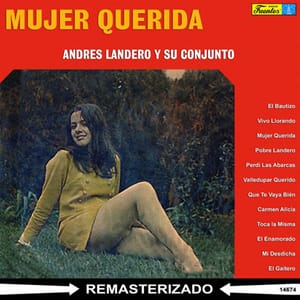Andres Landero Y Su Conjunto Pedrí las Abarcas (1966)
Rhythms that can be traced back to indigenous communities, drumming patterns from African slaves brought to Latin America by European colonizers, instruments like the accordion and the guitar introduced by the Spanish, and working-class lore reflecting the daily lives and struggles of youth—cumbia is a perfect reflection of Colombia’s complex past and present.
While the musical genre was mainly performed at local festivities along Colombia's Caribbean coast in the 19th century, it started to gain national attention in the early 1900s. From there, it spread to other parts of South America and the world over the course of the century.
One of the key figures in the world of cumbia is Andrés Landero, particularly known for his mastery of the accordion. Landero was active from the 1950s to the end of the century and is often referred to as the “King of Cumbia.” He is not only a hero among genre traditionalists, but also enjoys cult status among a specific youth movement in Mexico that had its peak in the new millennium: the Kolombia subculture, known for its fashion, including baggy clothes, lavish haircuts and colorful accessories.
The movement originated in the working-class neighborhoods of the northern Mexican industrial city of Monterrey. The local youth embraced and adapted the Colombian genre, creating a distinct regional style characterized by a slower tempo than traditional cumbia, often featuring a melancholic and rhythmic sound.
Original cumbia songs like Andrés Landero’s “Pedrí las Abarcas”—which is today’s song, by the way—are still played at Kolombia gatherings on the streets, though the songs are often pitched down. “If it’s slower, it lasts longer,” says Ulises, the main character in I’m No Longer Here, a recent movie set in the Kolombia scene. “I believe when it’s slower you feel it more.” Although Ulises has a point, we prefer to listen to “Pedrí las Abarcas” at full speed.

Start the conversation
Become a paid member of The Rest to gain access to the comments section.